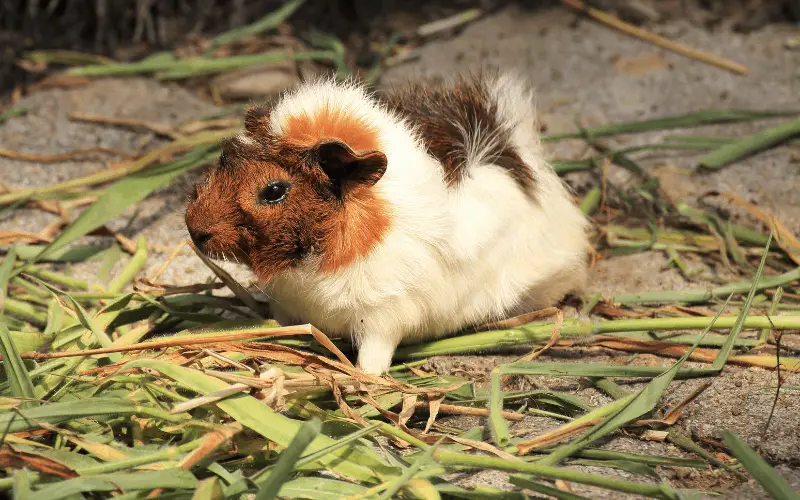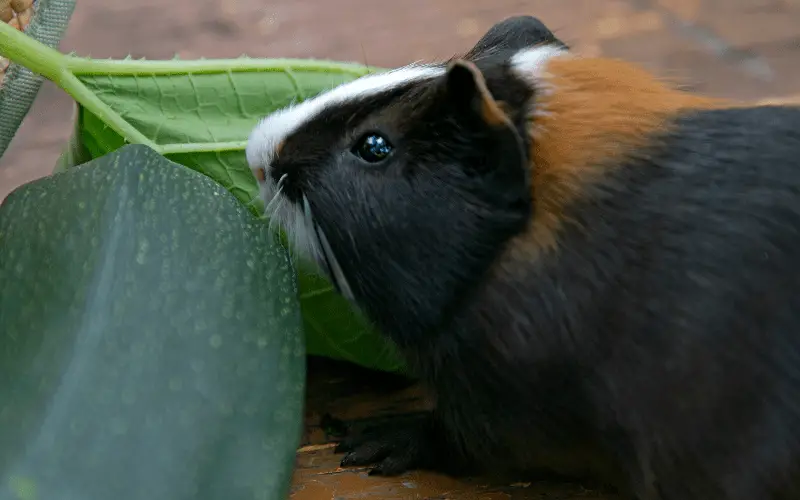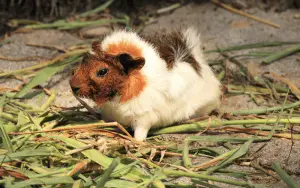Guinea pigs are herbivores and are used to grazing in small herds in the wild. Guinea pigs’ main diet usually consists of hay and pellets. Because their teeth that are always growing, guinea pigs need to constantly munch on roughages to help wear down their teeth and avoid dental problems.

But how much should a guinea pig eat? Knowing the right amount of food to provide for your guinea pig will help to prevent overfeeding your guinea pig, which can cause obesity, amongst other diseases.
How Much Should I Feed My Guinea Pig?
Guinea pigs have different food items they can be fed, and we are going to look at their recommended feeding portion for guinea pigs.
Read Also: Can Guinea Pigs Eat Basil?
Hay
Hay is the main source of fiber and roughage for your guinea pig. Guinea pigs need hay for both their digestive and dental health. Try to provide your guinea pigs with unlimited access to hay, by trying to refill a good-sized dish 3 to 5 times daily.
There are different types of hay, but Timothy hay is the best hay for all guinea pigs in general. It’s healthy for guinea pigs of all ages, and they will happily eat and play with it. Other types of hay include meadow hay, bluegrass, and orchard grass, although not all guinea pigs like them.
The type of hay you shouldn’t feed your guinea pigs six months and older is alfalfa hay because it contains a lot of calcium.
Feeding older guinea pigs with alfalfa hay frequently will cause a lot of health issues, but they can be used as an occasional treat.
You can feed alfalfa hay to pregnant and nursing sows and guinea pigs under six months of age. When purchasing hay, you need to make sure that it is green and soft; if the hay is yellow and hard, it means it’s straw.
You also need to make sure that the hay is dry, sweet-smelling, and does not contain any mold, mildew, or fungus.
When placing hay inside your guinea pig, it should be contained in a hayrack or basket; this prevents the hay from sitting directly on top of the cage floor, which can lead to contamination by your pet’s waste, and the hay can become dirty and moldy which can pose a lot of health risk if your guinea pig is to ingest it.
Pellets
Pelleted food is specially formulated to provide balanced nutrition with the right amount of Vitamin C and other essential nutrients to your guinea pig.
However, pellets should be offered to guinea pigs in small portions and occasionally because pellets sometimes have high sugar and energy content, which can lead to obesity and dental problems if overfed to your guinea pig.
Feed your guinea pig only a 1/8 cup of pellets per day in order to supplement its diet. When purchasing pellets, you need to make sure the pellets are Timothy, not alfalfa-based unless they’re for nursing/pregnant sows or guinea pigs under six months.
Also, make sure that the pellets are properly supplemented with vitamin C. Guinea pigs, like humans, cannot produce vitamin c, so it needs to be provided in their diet.
Make sure the pellets do not contain sugar, seeds, or colorful pieces (“muesli feed”) because they are unhealthy for your guinea pig, and they may easily get hooked on the sugar, which is very unhealthy.
Also, when purchasing pellets, you need to make sure they are designed for guinea pigs because Pellets for other rodents might not be suitable for guinea pigs due to the content of different quantities of essential vitamins and nutrients.
Veggies
Providing your guinea pig with a lot of food varieties will help to ensure your pet receives a well-balanced diet.
Fresh Veggies that you can feed your guinea pigs include dandelion greens, snow peas, broccoli, cabbage, endive, carrot tops, Brussels sprouts, celery, tomatoes without its vine, cucumber, corn (and corn husks), and bell pepper, kale, mint.
You can also feed your guinea pig fruits such as apples without its seed, mango, and papaya. Vegetables like beetroot, parsley, and forages such as clover or properly washed dandelion leaves should only be fed to guinea pigs occasionally.
Also, veggies like kale, spinach, and parsley are high calcium food that should be fed occasionally because too much calcium intake can cause bladder stones.
Always offer fresh, not spoiled, or wilted vegetables to your guinea pigs. Vegetables that you wouldn’t eat yourself shouldn’t be fed to your pet.
Also, vegetables like tomatoes are very acidic and can cause sores, so they should be fed sparingly, not more than 1-2 times a week.
Vitamin C
Because guinea pigs cannot produce vitamin C themselves, they rely on their diet and supplements for it. Guinea pigs should be fed at least 10 – 30 mg of Vitamin C daily. Bell peppers are a great source of it.
You need to make sure your Guinea Pigs receives the right amount of vitamin c because a low level of vitamin c can cause scurvy disease in your guinea pig.
Feeding your guinea pig the right amount of pellets and bell peppers will provide them with enough vitamin c, but you can always supplement its intake if necessary.
Do not add vitamin-c into your guinea pig’s water as it can cause your guinea pig to stop drinking water, which is highly not recommended.
The added vitamin C can change the taste of the water, and most of the vitamin C breaks down after 30 minutes of adding it to the water.
Foods also rich in Vitamin C include leafy green veggies, capsicums (green, orange, and red), carrots, kiwifruit, berries, and pineapple. These are all a source of Vitamin C, and there is also a tasty treat for your guinea pigs.
However, most of these food items should also be fed occasionally due to their high sugar content, and also try to ensure that a fruit or veggie is on the safe list before feeding it to your guinea pig.
Read Also: What Should Guinea Pigs Drink?
Foods That Are Not Good For Guinea Pig

Before feeding any food to your guinea pig, make sure that it is on the safe list because large amounts of fruits have very high sugar content, and some also have low calcium to phosphorus ratio, which could cause bladder problems and diarrhea.
This is true in fruits such as raisins, so fruits should only be fed to guinea pigs occasionally. This also includes starchy vegetables, such as potatoes, and high-calcium foods such as kale.
There are also vegetables you shouldn’t feed to your guinea pig at all; this includes iceberg lettuce, potatoes, avocado, and cabbage.
All types of citrus fruits are very bad for guinea pigs, and the acid can irritate their mouths.
Also, the guinea pig’s digestive system can only process plant-based items because they are herbivores. Feeding your guinea pig any animal byproduct will lead to serious digestive issues.
Watch this video:
Do not feed your guinea pigs commercial treats; they are a waste of money and offer no nutritional value for your pet. Giving your guinea pig a piece of apple or carrot is way better than a processed treat.
Instead of trying to supplement your guinea pig’s nutrition with multivitamins or salt, try to provide a balanced diet for your pet. Providing all These kinds of additions to your pet’s diet is not necessary; you only need to feed your guinea pig rightly.
In cases where you really need to feed your guinea pig supplements, make sure the supplement is vet-approved and is high in fiber.
Do not overfeed your guinea pig with veggies and provide them with only a small portion at a time. Guinea pigs chew instinctively and will continue eating as long as you feed them throughout the day.
So keep an eye on the amount of food you offer your pet and stick to a balanced diet. If the guinea pig is your kid’s pet, you should try and explain this to your kid. Overfeeding a guinea has a massive impact on its lifespan.
However, this rule is only applicable to vegetables. You should make sure your guinea pig has unlimited access to Hay throughout the day.
Always offer your guinea pig’s food in ceramic dishes because guinea pigs chew on anything they can get their teeth on, and food dishes are no exception. Try to use a heavy ceramic dish that can’t be easily be overturned or destroyed.
Always remove any food left uneaten by your guinea pig at the end of the day. This helps to ensure your guinea pig only eat fresh food, and sometimes Guinea pigs can be picky eaters; when food is left in their cage for too long, it won’t be appealing to them anymore.
Also, if your guinea pig had avoided a dish all whole day, they are probably never going to eat it, and it will be best to remove it, or it may become a mess in their cage.
Always keep an eye on the weight of your guinea pig and try to adjust the quantity of food they are fed if the guinea pig becomes underweight or overweight. The amount of food you can feed your guinea pig depends on its age, lifestyle, and its overall health.
So you may need to constantly change your guinea pig’s diet in order to keep your pet in good health. Before feeding your guinea pig any grass, herbs, fruits, and vegetables, make sure that they have not been sprayed by any chemicals because those chemicals can harm your guinea pigs.
Also, never feed Lawnmower clippings to your guinea pigs as these can cause gastrointestinal blockages and make your guinea pigs very ill.
Fresh, clean water should be provided to your guinea pig at all times. You can do this by placing a water bottle in your guinea pig’s cage so that it can have easy access to clean water all the time.
Always refill the water content and do not allow the water bottle to become empty. Dehydration can make a guinea pig very ill.
When purchasing a water bottle for a guinea pig, do not buy ones with springs because guinea pigs aren’t strong enough to access the water from these; instead, opt for water bottles that have a metal ball in the spout.
If the pen of your guinea pig is located outdoors, ensure that the water doesn’t freeze during the winter, and maybe your pet shouldn’t be out in the winter.
Try to frequently Clean the water bottle nozzle with a Q-tip in order to keep it free of obstructions and food residue. You can Clean the insides of the water bottle by placing uncooked rice and a little water in the bottle and then shaking it vigorously.
The rice mixture will help to remove any greenish (algae) build-up. After giving it a good shake, pour out the rice and fill the bottle with white vinegar to totally eliminate the algae. Rinse the water bottle thoroughly and put it back into your guinea pig’s cage.
Can my guinea pig graze on grass?
If you have a yard with a lawn that hasn’t been sprayed with chemicals or filled with other pet’s urine, you can let your guinea pig graze on it. Simply place a plastic playpen on an area and place your guinea inside and let it roam around in it during warm weather.
However, you have to ensure that there is no breeze and the outdoor temperatures are between 60 and 75 degrees Fahrenheit (15-24 degrees Celsius).
While your guinea pig is outdoors, you want to keep an eye on it and supervise the playtime till the end; while some guinea pigs already live in pens outdoors, leaving your pet in an open-air pen without supervision could leave them exposed to predators or your guinea pigs can try to escape.
Read Also: What Can Guinea Pigs Not Eat?
Conclusion: How Much Should A Guinea Pig Eat?
Knowing how much should a guinea pig eat will enable you to feed your guinea pig the right amount of food. Overfeeding your guinea pig is very detrimental to its health and should be avoided at all costs.
Small Pet Select 2nd Cutting Perfect Blend Timothy Hay Pet Food

Small Pet Select 2nd Cut Timothy Hay is a perfect balance of stem, seed-head, and leaf to provide the rough fiber needed for normal wear to healthy teeth and yummy features with a fresh smell to keep them coming back for more.
Product SKU: B07CJ2FRNC
Product Brand: Small Pet Select 2nd Cutting Perfect Blend
4.4
Pros
- Good value for the price
- Fresh, green and fragrantly rich scent
Cons
- Inconsistent that some have poor quality hay
Kaytee Timothy Complete Pet Guinea Pig Food

Kaytee Timothy Complete Guinea Pig food was developed by an animal nutrition expert to ensure your small pet gets the proper nutrition for a long, healthy life. Timothy Complete is high in fiber to support digestive health and contains long-lasting vitamin C.
Product SKU: B0002DGIGK
Product Brand: Kaytee Timothy Complete
4.8
Pros
- Recommended by mostly veterinarians
- Very Affordable at reasonable price
Cons
- Poor packaging/easily ripped bag
Choco Nose Patented No-Drip Water Bottle/Feeder

This Is The Best Small Pet Water Bottle For Your Beloved Pets. Providing A Wet-Free and Mess-Free Living Area For Your Furry Kids Is Very Essential. Choco Nose U.S. Patented Leak Proof Nozzle Can Prevent Water Leakage Effectively.
Product SKU: B00S1SY1X0
Product Brand: Choco Nose Patented No-Drip Water Bottle/Feeder
4.4
Pros
- Chew/Leak Proof
- Easy to Clean
Cons
- The holder breaks easily
